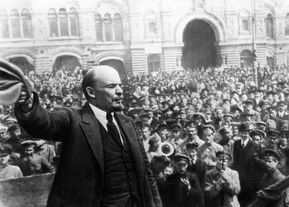 Today marks the centenary of Russia’s Bolshevik Revolution. As recent media broadcasts have repeatedly told us, Lenin’s men seized power in the autumn of 1917 and the world’s first communist state was born. But the reality was not so simple. Across parts of the Russian Empire the revolution unleashed a brutal civil war and it was several years before the Bolsheviks consolidated power. One such area was the territory of present-day Ukraine, my ancestral home. The fall of the Russian Provincial Government in Petrograd on 7 November 1917 (25 October according to the Russian calendar of the time) prompted a power struggle in Kiev that was to last for four years. The abdication of Tsar Nicholas II in March 1917 had led to the formation of Ukraine’s Central Rada, or parliament. In November, following the Bolshevik Revolution, it declared a Ukrainian People’s Republic opposed to Communist rule, and gained independence from Russia in 1918. In the years that followed, the government in Kiev changed hands so many times that it became difficult to keep track of who was supposed to be in charge. My family came from the village of Pavoloch, about 60 miles from Kiev. Here the October Revolution gave way to anarchy, as newly formed ‘banda’ – or armed factions – roamed the land. Some fought for Communism, others for Nationalism, Anarchism, Freedom or Holy Russia. The names of their leaders instilled fear: Petlyura, Makhno, Zeleny, Denikin. Later, in 1919 Pavoloch repeatedly became a sea of carnage as one banda after another passed through, stealing, raping, pillaging and killing. The White Army, under General Denikin, was the most ruthless of all. His professional soldiers were armed by western powers, including Britain, which wanted to see the Communists defeated. The Whites hated the Communists, but more than anything else they hated the Jews. They barged into Jewish homes, drew their swords and cut inhabitants down regardless of age or sex. Anyone who tried to escape was shot in the back as they fled. They threw grenades into cellars, blowing up entire families; poured petrol over synagogues and set them alight; raped thousands of women. One day five White Army soldiers burst into my family’s home. They searched the house for money, kicking down the door of the warehouse and smashing floorboards. One of the soldiers dealt my great-great grandfather a blow with his rifle butt and watched him crumple to the floor, then kicked him repeatedly in the stomach. They hustled the old man onto the table, pull his scuffed leather belt from around his waist and force his head into the noose they made with it. Then they hanged him from the meat hook on the kitchen ceiling. After the soldiers left, the frayed old belt snapped in two and my great-great grandfather landed with an almighty thump on the hard stone floor. He had survived! This is only one of around a dozen terrible incidents that affected my family during the Civil War. Here is Canadian scholar Orest Subtelny’s assessment of the time: “In 1919 total chaos engulfed Ukraine. Indeed, in the modern history of Europe no country experienced such complete anarchy, bitter civil strife, and total collapse of authority as did Ukraine at this time. Six different armies-– those of the Ukrainians, the Bolsheviks, the Whites, the Entente [French], the Poles and the anarchists – operated on its territory. Kiev changed hands five times in less than a year. Cities and regions were cut off from each other by the numerous fronts. Communications with the outside world broke down almost completely. The starving cities emptied as people moved into the countryside in their search for food.” The Bolsheviks finally secured power in the region in 1921 and the following year it became part of Soviet Ukraine.
0 Comments
Leave a Reply. |
Keeping stories aliveThis blog aims to discuss historical events relating to the Jewish communities of Ukraine, and of Eastern Europe more widely. As a storyteller, I hope to keep alive stories of the past and remember those who told or experienced them. Like so many others, I am deeply troubled by the war in Ukraine and for the foreseeable future, most articles published here will focus on the war, with an emphasis on parallels with other tumultuous periods in Ukraine's tragic history. Archives
March 2024
Categories
All
|
 RSS Feed
RSS Feed
